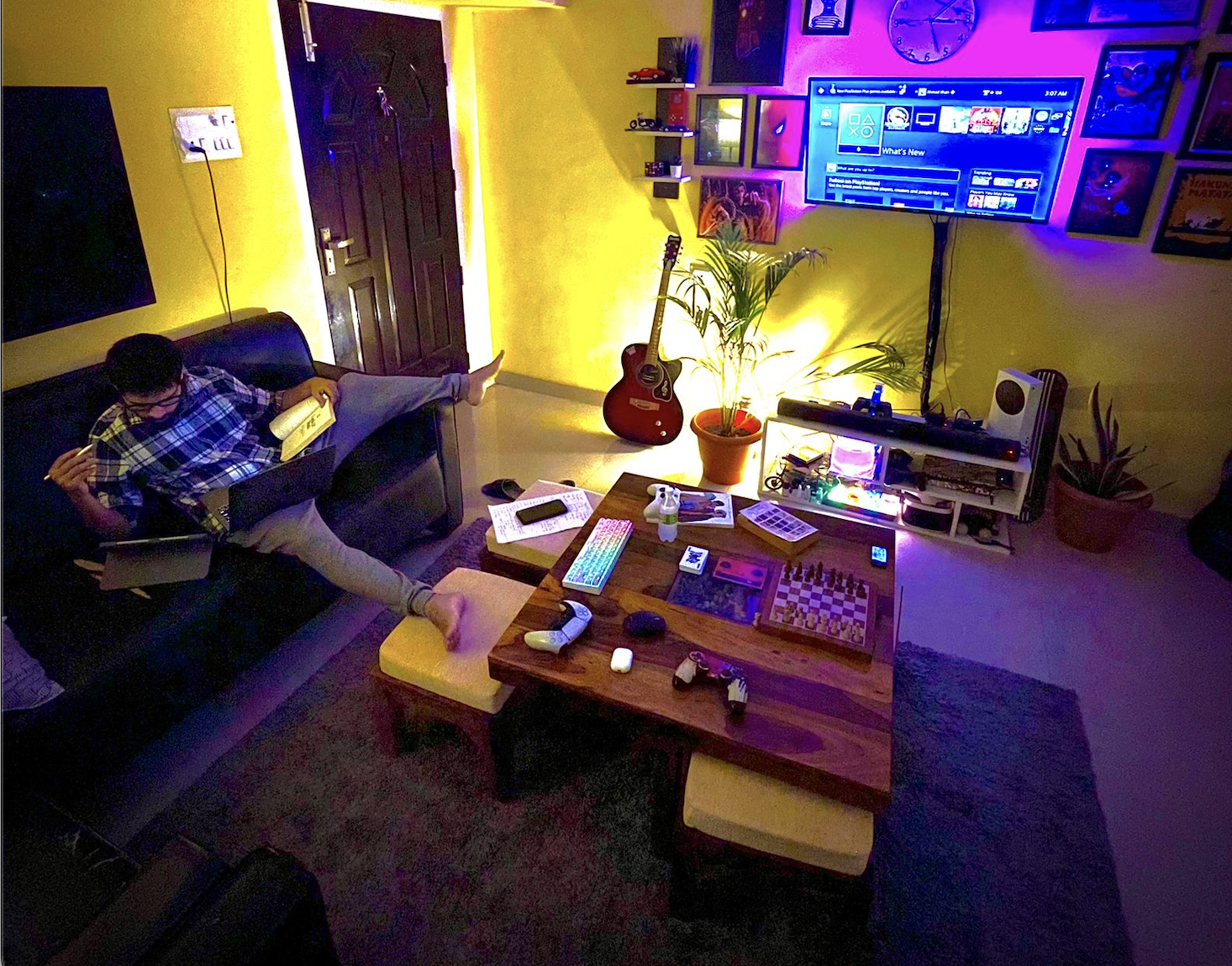The Joy of Research as a Hobby
 Ahmad W Khan
Ahmad W Khan
When asked about my hobbies, I often find myself defaulting to the typical answers—reading, traveling, coding. Yet, there's one passion I seldom mention, not out of shame, but due to its unconventional nature: research. Not the formal, structured research conducted in academic institutions, but a more freestyle form of inquiry driven purely by curiosity. This form of research, I believe, is not only valid but immensely fulfilling and beneficial.
The Allure of Freestyle Research
Imagine sitting in a cozy corner of your home, a cup of tea steaming beside you, surrounded by a stack of books, your laptop open to a plethora of PDF files, and a notepad filled with scribbles and doodles of interconnected ideas. This is my sanctuary. This is where the magic happens.
Freestyle research begins with a spark—an idea, a question, a moment of curiosity. It’s the process of following this spark wherever it may lead, without the constraints of formal methodologies or the pressures of academic expectations. The joy lies in the journey itself: the thrill of uncovering new information, the satisfaction of piecing together disparate bits of knowledge, and the excitement of discovering that one piece of the puzzle that makes everything else fall into place.
A Personal Anecdote
One weekend, I found myself engrossed in the works of ancient philosophers, tracing the evolution of economic theories, delving into historical events, and even exploring my own family genealogy. My curiosity led me to code an app for my family's genealogy, tracing our lineage as far back as the 1200s. This ongoing project involves interviews, historical research, and the digitization of old family records. It’s a testament to how research can evolve into creation, contributing to a greater body of knowledge and preserving history for future generations.
Breaking the Academic Mold
Traditional academia, while valuable, often constrains research within narrow disciplinary boundaries. This can create barriers for enthusiasts and hobbyists, making it seem like serious research is the exclusive domain of the academic elite. However, true knowledge knows no bounds. The autodidacts, the self-taught researchers, bring a fresh perspective that is often interdisciplinary, holistic, and innovative. They remind us that the pursuit of knowledge is not about titles or degrees, but about curiosity and the joy of discovery.
The Stifling Nature of Conventional Academia
Academic institutions, by design, tend to silo knowledge into distinct categories. A historian might rarely venture into the realms of quantum physics, and a biologist might not consider the philosophical implications of their work. This compartmentalization, while useful for specialization, often stifles the kind of creative, interdisciplinary thinking that leads to true innovation.
As a self-taught software engineer with over a decade of experience, I’ve never felt constrained to a single field of study. Instead, I’ve reveled in connecting the dots between different domains, whether it’s understanding the psychological aspects of user experience design or exploring the ethical implications of artificial intelligence. This eclectic approach has enriched my understanding and made my professional work more insightful and impactful.
The Benefits of Hobbyist Research
Engaging in research as a hobby offers numerous benefits, both personal and intellectual. It’s not just about finding answers; it’s about the process and the mindset it cultivates.
Mental Stimulation and Cognitive Benefits
Research keeps the mind sharp. It involves critical thinking, problem-solving, and analytical skills. The process of asking questions and seeking answers stimulates cognitive functions and keeps the brain active. Studies have shown that engaging in intellectually stimulating activities can help maintain cognitive health and delay the onset of age-related cognitive decline.
Fostering Interdisciplinary Thinking
Hobbyist researchers often explore topics across various fields. This interdisciplinary approach leads to a more comprehensive understanding of complex issues and fosters creativity and innovation. For instance, my explorations into philosophy, history, and economics have deepened my appreciation for these fields and inspired me to incorporate their principles into my software projects.
Personal Fulfillment and Satisfaction
There is a deep sense of satisfaction in uncovering answers to questions that intrigue you. This personal fulfillment goes beyond professional achievements recognized by others. It’s a quiet, internal joy that comes from knowing you’ve expanded your understanding and satisfied your curiosity.
Holistic Perspective on Life
By not being confined to a single discipline, hobbyist researchers can see connections and patterns that others might miss. This holistic perspective is invaluable in understanding and addressing real-world problems. It enables a more nuanced view of the world, where everything is interconnected, and no knowledge is wasted.
Encouraging a Culture of Curiosity
We should celebrate and encourage those who pursue research as a hobby. These individuals are the misfits who break down barriers and challenge conventional thinking. They enrich our understanding of the world and contribute to a culture of curiosity and lifelong learning.
Practical Steps to Foster Hobbyist Research
Accessible Resources: Making research materials and resources more accessible to the public can empower more people to engage in independent research. Libraries, online databases, and open-access journals play a crucial role in this.
Community Support: Creating communities where hobbyist researchers can share their findings and collaborate can provide support and validation. Online forums, local clubs, and social media groups dedicated to various research interests can foster a sense of belonging and shared purpose.
Recognition and Validation: Acknowledging the contributions of autodidacts and hobbyist researchers can help break down the stigma that serious research must be academically sanctioned. Celebrating their achievements through awards, publications, and public recognition can validate their efforts and inspire others.
My Journey as a Hobbyist Researcher
My own journey as a hobbyist researcher has been a winding path filled with unexpected discoveries and profound insights. From the intricacies of ancient philosophy to the evolution of economic theories and the detailed history of my own family, each exploration has added a layer of depth to my understanding and enriched my life in ways I never anticipated.
A Passion for the Unknown
I have always been curious, dabbling in a myriad of interdisciplinary subjects. As a self-taught software engineer, I’ve never felt the need to confine myself to a single field of study. Instead, I’ve embraced a holistic approach, connecting the dots between different domains and uncovering new insights along the way.
For example, my interest in user experience design led me to explore cognitive psychology and human-computer interaction. This, in turn, sparked an interest in behavioral economics and decision theory, which has profoundly influenced my approach to software development. Each new interest builds upon the previous one, creating a rich tapestry of knowledge and understanding.
The Thrill of Discovery
One of the most exhilarating aspects of hobbyist research is the thrill of discovery. There’s nothing quite like the moment when a piece of information clicks into place, revealing a new insight or opening up a new line of inquiry. This thrill is what keeps me coming back, driving me to dig deeper and explore further.
Research as a Catalyst for Creation
Research should not be a passive activity. It should lead to creation, contribution, and documentation. My genealogy project, for instance, began as a research endeavor but soon evolved into the creation of a family genealogy app. This app has become a digital archive, preserving our family's history and making it accessible to future generations. The process involved not just coding but also conducting interviews with family members, transcribing old documents, and connecting the dots with existing history.
Moving the Needle Forward
Every piece of research we conduct adds to the collective knowledge of humanity. By documenting and sharing our findings, we move the needle forward, contributing to a greater understanding of the world. Whether it’s through writing articles, creating digital tools, or simply sharing insights with others, our work as hobbyist researchers has the potential to inspire and inform.
Celebrating the Misfits
If you are someone who loves digging for answers and breaking things down to first principles, welcome to the land of misfits. Your curiosity and unconventional interests are not only valid but invaluable. Together, we can create a richer, more holistic understanding of the world and inspire others to embark on their own journeys of discovery.
Building a Supportive Community
Creating a supportive community for hobbyist researchers is essential. By connecting with like-minded individuals, we can share our findings, learn from each other, and collaborate on exciting projects. This sense of community fosters a culture of curiosity and lifelong learning, where everyone’s contributions are valued and celebrated.
Final Thoughts
Research, in any form, is a celebration of human curiosity and the pursuit of knowledge. It is time we embrace and encourage research as a hobby, recognizing its potential to expand our minds and enrich our lives. So, let us continue to ask questions, seek answers, and revel in the joy of discovery.
Conclusion
Engaging in research as a hobby is more than a pastime; it’s a way of life. It keeps the mind young, fosters interdisciplinary thinking, and brings a deep sense of personal fulfillment. By celebrating and supporting hobbyist researchers, we can create a culture that values curiosity and lifelong learning. So, the next time someone asks about your hobbies, don’t hesitate to share your passion for research. You might just inspire them to embark on their own journey of discovery.
To know the next step on how to properly conduct and publish your research, you may read the article I wrote about it here.
For an example of doing structured research, you can read a case study of doing sociological research here.
Thanks for reading! To reach out to me, visit AhmadWKhan.com.
Subscribe to my newsletter
Read articles from Ahmad W Khan directly inside your inbox. Subscribe to the newsletter, and don't miss out.
Written by
